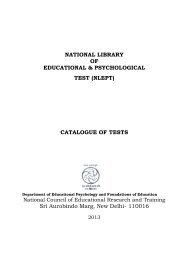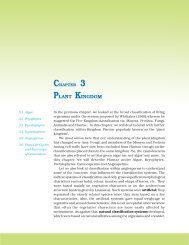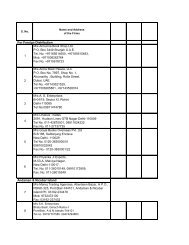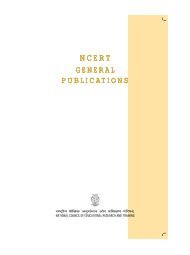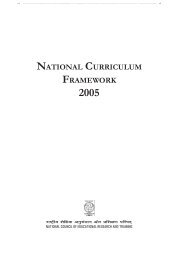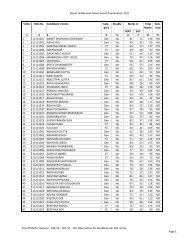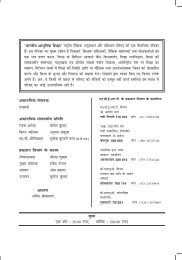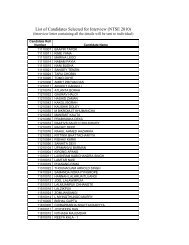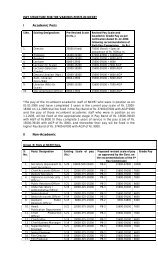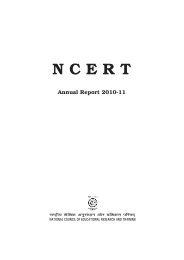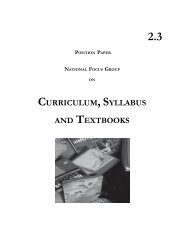indian education - National Council Of Educational Research And ...
indian education - National Council Of Educational Research And ...
indian education - National Council Of Educational Research And ...
Create successful ePaper yourself
Turn your PDF publications into a flip-book with our unique Google optimized e-Paper software.
Strengthening the role of State in School Education vis-à-vis the Private Initiative 111<br />
Making elementary <strong>education</strong> a<br />
fundamental right by this amendment<br />
has reinforced the role of the State in<br />
achieving the goal of free, universal<br />
elementary <strong>education</strong> as envisaged in the<br />
Directive Principles of State Policy. The<br />
increasing responsibility entrusted by<br />
the Act on the one hand and the<br />
increasing growth of private schools on<br />
the other, pose a question on the role and<br />
the credibility of both the State and the<br />
private actors.<br />
Understanding Private Schools: A<br />
Sociological Perspective<br />
Education, like health is primarily a<br />
public good. The public good ethos is<br />
linked to socio-democratic ideals of<br />
opportunities and access for many. Since<br />
the fundamental assumption that<br />
<strong>education</strong> would help erode the socially<br />
inherited structural inequities and<br />
provide opportunities for social<br />
advancement through equity of access<br />
and opportunity, it would continue to be<br />
regarded as public good (Levin, 1987).<br />
<strong>And</strong> in a country like India where<br />
majority of the population is below<br />
poverty line and belong to the lower<br />
income strata and also where<br />
<strong>education</strong>al achievement compares still<br />
low with other developed countries of the<br />
world, <strong>education</strong> should not be limited<br />
by financial considerations.<br />
While analysing private schools in<br />
<strong>education</strong>, it would be appropriate to<br />
take into account the available evidence<br />
about locational distribution, social<br />
reach by looking into the class and social<br />
composition of these schools to assess<br />
the nature of clients of private schools.<br />
The general assumption is that the<br />
private schools cater <strong>education</strong> mostly<br />
to the children of higher income strata<br />
and generally the elite class in the<br />
society. It is also found that private<br />
schools are concentrated mostly in the<br />
urban areas. However, their spread has<br />
now even penetrated in the rural areas<br />
also. Gender bias is also witnessed<br />
though less pronounced, taking into<br />
consideration the income level of the<br />
families. For example, parents unable to<br />
afford sending both their children to<br />
private schools will prefer their male<br />
ward to be sent to the private school. If<br />
these assumptions of the private school<br />
hold true, and as some of the findings<br />
even show and if they remain an<br />
exclusive domain of a few children of the<br />
affluent families, then it will do more<br />
harm than good in <strong>education</strong> and<br />
achievement of universal elementary<br />
<strong>education</strong> will remain an illusion.<br />
Anuradha De et at. (2002) findings<br />
on the percentage distribution of the<br />
primary and upper primary students<br />
from two polar groups in 1993 reveal two<br />
different worlds of <strong>education</strong> if we take<br />
into consideration two extreme cases of<br />
rural, female SC/ST students of India<br />
and urban, male forward caste students<br />
of the same country. Only about 2 per<br />
cent in the primary and 5 per cent in<br />
the upper primary students of the former<br />
category are taught in the private<br />
unaided schools. <strong>And</strong> the evidence that<br />
private school enrolment is biased<br />
towards males is more straightforward.<br />
Dreze and Gazder (1996) in their<br />
study in Uttar Pradesh also reveal that<br />
school attendance in private schools is<br />
‘significantly male dominated as parents<br />
are more willing to pay for male children’.<br />
This could be attributed to parents’ more<br />
willingness to permit a male child to



